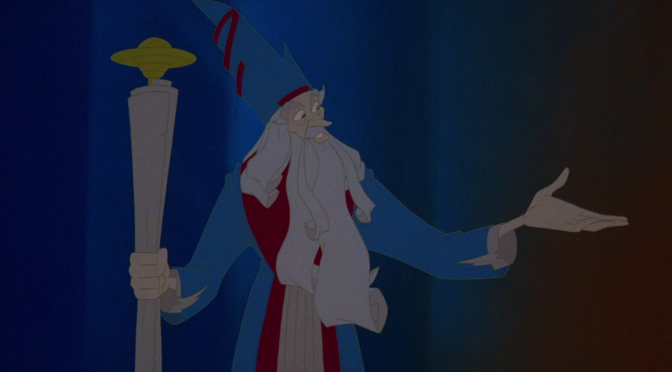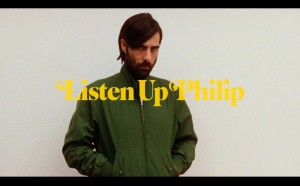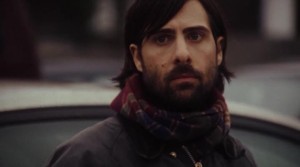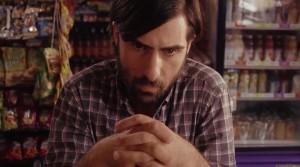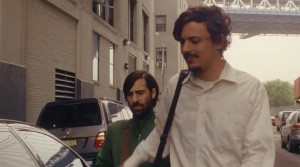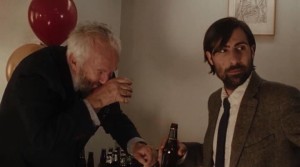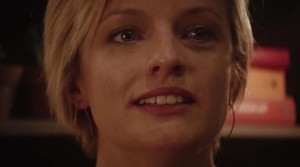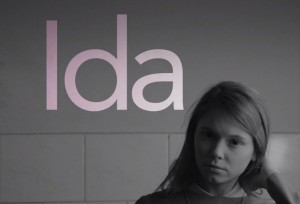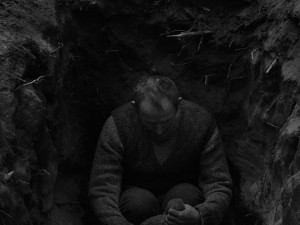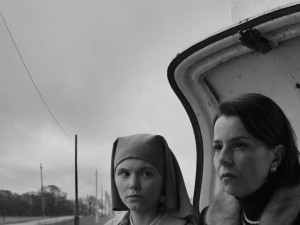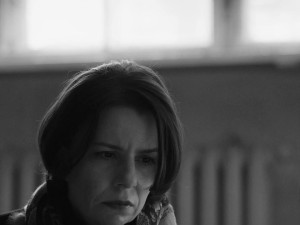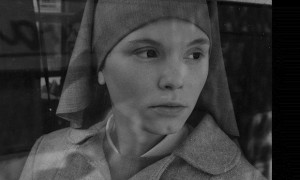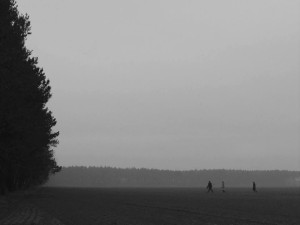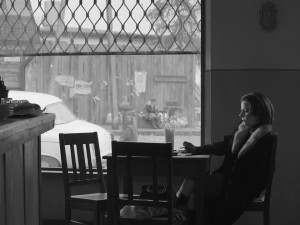
Monthly Archives: March 2015

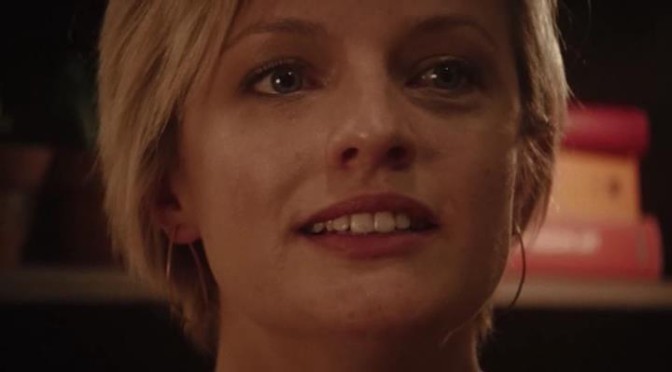
Best Films of 2014: #11- Listen Up Philip
An artist walks a fine line when choosing to make art about the flaws and failings of other artists. There are a plethora of traps one can fall into when making a work that aims to dissect the fallible human beings behind the artistic process. If the artist pulls their punches too much, what purports to be probing can come off looking less like critique and more like an act of self-congratulation. I found this to be the case in this year’s Birdman, which held itself out as a takedown of the pettiness and megalomania of flawed creative types, but felt more like humble bragging on the part of its creator. On the other side, a work of art that plunges too passionately into attacking the egoism of the artist can lose itself in the woods of cynicism. I found this to be the case with Noah Baumbach’s worthy but flawed Margot At the Wedding, which sent up arrogant pseudo-intellectuals in such an unsparing manner that it seemed to surrender itself to the very misanthropy it was skewering. Most of the best art manages to keep one foot in empathy, even when it focuses on the darkness inside the artist’s soul. But how does the artist turn his or her lens on the selfishness and vanity of genius without becoming just as judgmental or self-righteous or vain as the deeply flawed figure they depict? It is a challenge that has bested a great many talented writers and directors, and I do not have a definitive answer for how one threads that needle. But I can say that, every now and then, an artist manages a damning portrait of artistry that strikes just the right tone and maintains just the right distance from its subject. Bennett Miller’s Capote did this by embracing Truman Capote’s unquestionable genius, while simultaneously saying that no amount of sublime talent could save his soul. While funnier and less apocalyptically bleak than Capote, I believe Alex Ross Perry’s Listen Up Philip attains its success in a similar way. Perry’s marvelous film puts the lie to the idea that compassionate, soulful art necessarily comes from compassionate, soulful people. It is fascinated with the notion that the very person whose art inspires the world to reflect on human potential may be personally incapable of the same growth and self-reflection their work compels in others. Perry has found a way to marry a merciless autopsy of creative self-involvement with a beautiful, generous look at human longing and frailty. As a portrait of the artist as a young asshole, it is one of the most fearlessly acidic character studies in recent memory. It is also, improbably and paradoxically, one of the sweetest and subtlest.
Listen Up Philip sets itself a gargantuan challenge from the start by making its central figure, the titular Philip Louis Friedman (Jason Schwartzman), one of the most unabashedly nasty, unapologetically narcissistic artists to ever occupy a movie screen. We meet Philip, a young novelist whose star is beginning to rise, as he walks through the streets of New York City. He is on the way to meet an ex-girlfriend at a local cafeteria. Before Philip ever opens his mouth, a steady stream of dry voiceover narration, which will run throughout the film, informs us that he is a short-tempered, blustering braggart. When Philip sits down at the lunch counter and begins to speak, it is to launch into a bitter and meticulously rehearsed harangue against the onetime paramour who doubted his writing talents and would have seen him stop short of his dream of literary celebrity. He professes to have called her to lunch to gift her with a copy of his first published novel, but it seems more likely that he has met with her to that she can see him change his mind about giving her that honor. He rides out of the restaurant on a wave of self-righteous indignation and tears up the dedication page he has signed for her. He immediately goes from there to meet an old college roommate and literary colleague, so that he can take him to task for jettisoning his ideals and falling short of the success that Philip has been fortunate enough to achieve. Philip is a monster doomed to perpetually swing between the poles of his crippling insecurity and his prideful disgust for the human beings that surround him. Fortune and artistic credibility are just beginning to materialize for Philip, but he does not see this as a reason to relax his feelings of enmity or forgive past slights, perceived or real. Another ex-girlfriend tells him that success has only worked to make his soul uglier and to exacerbate his most selfish instincts. As Ethan Hawke’s character says in Before Sunset, giving a miserable asshole a yacht will do little more than make him a miserable asshole with a yacht.
Surprisingly, in spite of his all-consuming paranoia and an almost pathological need to preemptively strike those who have been good to him, Philip still has plenty of loved ones and well-wishers. When we meet Philip, he is two years into a relationship with a beautiful and talented photographer named Ashley (Elisabeth Moss, in a transcendent and effortlessly perceptive performance). We also watch him strike up a professional relationship and eventually a friendship with one of his idols, an aging, once-prolific author named Ike Zimmerman (Jonathan Pryce, giving terrific shades of ferocious pride and lonely vulnerability to a literary lion in the autumn years of his life). The problem with Philip is that, even when the movie gives us reasons to want to forgive him or empathize with him, he is never more than two steps away from his next unspeakably cruel decision. Anyone can seem sympathetic when the world seems to be acting against them, but the true nature of a person’s character is how they treat others when they are riding high on life. When Ike offers Philip access to his cabin in upstate New York, as a place to write his second novel far from the distraction of metropolitan life, Philip does not pay the generosity of this act forward. Instead, he uses it as an excuse to behave callously toward his kind, patient girlfriend. With almost no warning, he announces that he is leaving Ashley in New York City and will not see her for six months. Ashley looks both painfully betrayed and yet somehow unsurprised. The unloving monster in front of her has always been there, but perhaps he has only revealed himself gradually. Life has been kind to Philip, but that warmth and fortune does not seem to register with him. Even as life smiles and those around him do him good turns, he regards all of it as a solitary struggle; a battle he is winning alone and against all odds. “I supported you when nobody gave a shit about you,” Ashley stammers with wounded eyes. “I want you to know I regret that now.”
While the central role of Philip provides Jason Schwartzman with the opportunity to give what may be his finest piece of acting yet, his notable achievement is tertiary to the two phenomenal performances by Elisabeth Moss and Jonathan Pryce, playing the two most important figures in Philip’s relentlessly self-absorbed life. Part of the reason Listen Up Philip avoids becoming the emotionally suffocating story of its insufferable protagonist is that it consistently undermines Philip’s need to be the central figure of the story. Title be damned, Listen Up Philip is not the story of Philip, the terribly inconsiderate and emotionally abusive genius who is just too compelling to look away from. He is perfectly easy to look away from, and Perry never forgets it. The two tremendously complex characters of Ashley and Ike refuse to kowtow to Philip’s whims. Listen Up Philip may be about a man who is the center of his own toxic world, but the film is vibrant and interesting because it is about a much bigger world than the one Philip sees. His film is an act of concerned, somewhat fascinated observation. Perry is not interested in using Philip’s genius as a means to gloss over his cruelty, nor in sinking his fangs too deep into a man who seems perfectly adept at ruining his own life. Primarily, Perry just wants to show us an impeccably rendered, funny, and vital world full of artists. Most of them are jostling for esteem just as voraciously as Philip is, even if none of them pursue it in such a pig-headedly self-destructive way. Pseudo-intellectualism is a part of this world, but Listen Up Philip is neither bitter nor misanthropic about its ensemble of vain, confused, posturing artistes. I believe it is remarkably fond of all of them, and that that only serves to compound the tragedy of Philip’s own solitary, egomaniacal journey. Perry’s film is a rich, detailed and subtly satirical look at the world of the literary elite and at one burgeoning “great man” who methodically isolates himself from that world, even as he rises within it.
In the case of Jonathan Pryce’s Ike Zimmerman, the character is too possessed by his own lofty legacy to cede the spotlight to another ego. The mentorship and friendship that develop between Philip and Ike is hilarious and perversely touching because of how much these two tyrannical egos both mirror and undercut one another. Ike is perhaps the one person in the world who Philip not only respects, but bows to, and his hunger for Ike’s validation is crucial in revealing the layers of naked, squirming humanity beneath Philip’s pretentious exterior. When Philip looks at the world, he sees a throng of jealous, pedestrian half-wits. As such, no person has the power to bring Philip down from the pedestal that he tirelessly erects for himself. Ike is the one exception to Philip’s one-size-fits-all contempt. He is the one man whose counsel Philip seeks and the only person with the power and clout to puncture Philip’s bloated self-image. Ike continually frustrates Philip’s need to be revered by repeatedly reminding him of how much more he had achieved by the time he was Philip’s age. Philip’s desire for central billing in his own life story is continually stymied because the one man whose approval he craves is not ready to relinquish that role. On the other hand, Ike’s desire to be thought of as the brilliant, beloved literary scion is consistently undermined because the young charge he has chosen for a doppelganger is such an unrepentant shit. Having Philip as a prodigy allows Ike to feel he like he is passing off the torch of his own great legacy, but Philip also reflects Ike’s own pride and myriad failings back at him. As with the rest of the film, Perry presents the dance of these two egos honestly but never veers into mean-spirited condescension. By allowing these two prickly writers to form a relationship that is clear-eyed and insightful in all its preening pettiness, Perry achieves the cagey balancing act of presenting artistic arrogance in a manner both truthful and loving.
Perry’s biting look into the insular world of artists should have been an exhausting, high-brow slog. The fact that it is not is due to what I would call perfect cinematic mixology. Watching Perry bring this tapestry of conceited, posturing intelligentsia together is like watching a bartender fill a cocktail shaker with jalapenos and absinthe and Fernet Branca. You brace for the worst. The odds are against such intense and bitter flavors even being palatable together, much less harmonious. And yet, somehow, the experience is invigorating and funny and flavorful both in spite of and because of its difficult ingredients. Full credit goes to Perry’s ability to blend scathing humor with a real tenderness for human frailty. Perry is undeniably deft at keeping his camera trained on the monstrous Philip without letting the film itself take on the notes of his sourness and cruelty. The film has a concerned, protective arm around Philip, but it never becomes beholden to his unhealthy solipsism. The scenes between Ike and Philip are perfectly observed, and they allow us to care about Philip even if we do not care for him as a person. That said, these beautifully insecure pissing contests between the proud, aging genius and the boastful young prodigy could have become unbearably misanthropic if they were the sole focus of Listen Up Philip. Perry’s secret weapon is Philip’s girlfriend, Ashley. In the middle of the film, Philip jettisons Ashley from his life and leaves her to wallow in loneliness and rejection, as he climbs toward fame and fortune. In Philip’s megalomaniacal mind, every single waking moment is the story of Philip Louis Friedman. If he had his druthers, Listen Up Philip would be the story of a prickly artiste’s rise to the top, in spite of the many small-minded individuals who stood in his way. But Alex Ross Perry sees the story differently. When Philip leaves Ashley, Perry’s camera stays with her. Perry stays with her for a full twenty minutes and, in so doing, temporarily edits Philip out of the film that bears his name. Perry watches Ashley mourn and watches Ashley pursue her own art. He watches Ashley sift through the detritus of her relationship and visit with old friends and slowly heal. These twenty minutes add up to one of the most blissful, candid, perfect accounts of a breakup ever put to film. And they allow Elisabeth Moss, with her wounded, vulnerable, luminous performance, to steal Listen Up Philip away. In a film full of delicate, observant scenes, Ashley’s breathless twenty minute passage is the unquestionable apex in terms of both acting and writing. Ashley takes what first appeared to be Philip’s story and defiantly scribbles a narrative of her very own. It is the year’s most exhilarating act of soulful, feminist piracy. Ashley’s stolen “chapter” hums and coos with such lovely, understated humanity that it makes Philip’s own story feel every bit as small as it should. Philip is a gifted writer destined for a prosperous career- and so bloody what? Perry poses a vital question about the line between creating art and being human. How much can an artist tell us about humanity when he refuses to look at anyone but himself? How truly great can any artist be when they lack the capacity for empathy? What Philip lacks, Alex Ross Perry has in spades.
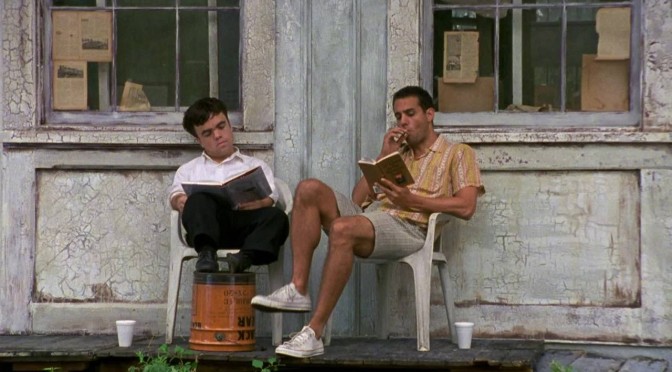
Carnivorous Couch 048 – The Station Agent

Carnivorous Couch 047 – The Baxter
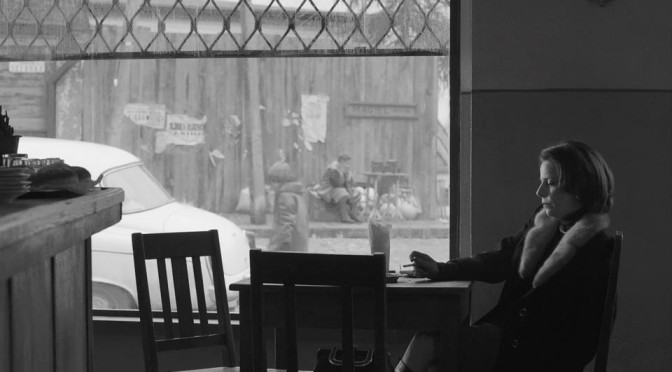
Best Films of 2014: #12- Ida
“Ghost, ghost I know you live within me
I feel you as you fly
In thunder clouds above the city
Into one that I love
With all that was left within me
Until we tore in two
Now wings and rings and there’s so many
Waiting here for you.”
– “Ghost” by Neutral Milk Hotel (from In the Aeroplane Over the Sea)
Before I can delve into Ida, (a gorgeous, chilly, and haunting look at Poland after World War II), I must spend a substantial length of time discussing other works of art. You see, a certain line of criticism states that we have reached a point of saturation when it comes to films about the despicable inhumanity of the Holocaust. This view has always rankled me a bit. I do not believe we can ever have too much intelligent, passionate, outraged art on any subject, and certainly not when it comes to the most horrific genocide of modern times. I will concede that we can do without any more films that misappropriate the Holocaust, by using it as a background tragedy for romantic trysts (The Reader), exploiting it for bathos (The Boy In the Striped Pajamas), or exploring its untapped comedic possibilities (Life Is Beautiful). But, I vehemently disagree that art is done having its way with the 20th century’s most harrowing act of inhumanity. The problem is not oversaturation, but that too many accounts of the Holocaust are so toothless in grappling with its full horror. Too rarely does the treatment fit the crime. One of the very best documents of the genocide is the album In the Aeroplane Over the Sea, by the alternative rock band Neutral Milk Hotel. Apart from brief references to places and the time period, the album stays away from historical specifics. Like a musical version of Picasso’s Guernica, it is horror seen through a thick, distorting glass. It is a fever dream account of the atrocities Anne Frank suffered. Though it is tinged with sorrow, its dominant emotion is a kind of keening madness that borders on Dadaism. It does not contain names like Hitler or Himmler or Goebbels, but it shivers and wails with the knowledge that entire generations of people could be eradicated by the beastly inhumanity of a single political movement. This, to my mind, is the response the Holocaust should provoke in us. It should have us tearing our hair out at its visceral cruelty, not rubbing our chins somberly at the philosophical implications of it all. And so, all of this is to say that Pawel Pawlikowski’s Ida is a document of genocide that can stand proudly with the best works of art on that subject. While it has the appearance of a stately film, and is certainly a more traditional document of genocide than In the Aeroplane Over the Sea, it also succeeds by way of implying more than it shows. It manages to convey horror and sorrow in a way that is no less visceral for being subdued.
Ida takes place in Poland in the 1960s, but its mind is always looking twenty years back. Ida begins as the story of Anna, a young novice in a Polish convent, becomes the story of Ida Lebenstein, and ends with a young girl’s identity in flux. Ida, it turns out, is Anna. This birth name is the moth-balled heritage that Anna’s deceased Jewish parents bequeathed to her, though she does not remember ever knowing them. She has been raised by the good Christian mothers and sisters at her convent almost since infancy, and when we first see her, painting an unfinished statue of Jesus Christ, she is a week away from taking her vows. The Mother Superior insists that, before committing to the life of a nun, Anna experience some of the outside world and meet the aunt she never knew she had. Anna reluctantly agrees, but seems to have little doubt that she is destined to live her life as a devout follower of Christ. Anna goes to the Warsaw apartment of her only living relative and finds an immediate foil to her own piety and reserved nature. Her aunt is an acerbic, boozy, promiscuous magistrate judge named Wanda Cruz (brilliantly played by Agata Kulesza). Moments after meeting her for the first time, Wanda informs Anna that her real name is Ida Lebenstein, and that she is a Jew. Her parents were among many Jews killed by their own Polish countrymen during the war and they are buried somewhere near the farmhouse the family used to own. Ida expresses a desire to visit their graves, which lie unmarked somewhere in the Polish countryside where the family used to live, and Wanda agrees to take her. So it is that Ida becomes a mournful, sobering, quietly livid road trip through 1960s Poland and into the even more distant past.
Along the way, the film becomes a study in the way that the Holocaust not only eradicated entire generations, but bruised, distorted, and mangled the identities of those who remained. As a magistrate, Wanda uses her political muscle to get answers about where her sister and brother-in-law are buried. She cajoles and bullies and barely conceals her simmering rage. We cannot blame her. The Poland Wanda moves through does not seem remotely apologetic about the tragedies that many of them facilitated and perpetrated. A local bartender refuses Wanda any answers and apologizes. Wanda asks him why he is apologizing, and he clarifies that this is just something one says. Wanda would survive Nazism and rise to a position of power as a member of the Communist political elite. However, that political influence has not brought her happiness nor sated her anguish at seeing loved ones murdered. Instead, she has become what she hated: an authority figure helping a political movement to exterminate those it deems threatening. She has tried to drown out the trauma of the past by fully embracing the perks of her high position. She has escaped the wake of Hitler’s regime and can now fill her life with merriment, drink and fornication. She often mocks Ida for her naïve notions of purity and spirituality. Wanda has seen behind the curtain of human cruelty and cannot understand why anyone would choose a life of selfless devotion to humanity. Kulesza’s turn is so spell-bindingly sardonic and vital that it took me half the film before I could see the tragedy behind her salty exuberance. Ida’s notions of Christian charity may be waylaid and simplistic, but Wanda’s secular swinger’s life is hollow to the core. It is her braying, desperate attempt to block the sounds of the ghettos and the camps from her ears, and it has been an abject failure. Ida is the story of what genocide does to the psyche, told through the focused fury of two amazing female characters. In Wanda’s case, Ida becomes a story about how all-engulfing the aftermath of war and death can be. When one has lived through certain experiences, no amount of wealth, power, sex, or drink can blunt them.
While Wanda fumes and pushes for clues, young Ida takes a passive stance, taking everything in with equal doses of horror and curiosity. In embarking on the simple mission to find a burial site, Wanda is guiding Ida backwards into a Poland that has been concealed from her. Outside the convent walls, she sees a nation filled with collaborators and cowards. She sees a Poland too ashamed to speak frankly about its role in the Holocaust and too pig-headedly proud to make a full apology. A lot of people died and they were all there to witness it, but the polite thing to do is not to press them to discuss it further. The country she sees makes a show of being conciliatory toward what happened to the Jews, but that same country took her true identity away from her and placed her in the safe haven of a less-persecuted religious tradition. In one scene, as Ida and Wanda are just leaving the farm house where her Jewish parents were murdered, a local woman sees her habit and asks her to bless her infant child. The past is never past. The Nazis may be gone, but the traces of their bigotry still hang in the air. A quiet Christian is met with a smile and a warm greeting. An inquisitive Jew is met with hostility and stubborn reticence. Ida is a film about looking to the past for closure and finding that none exists. Some wounds cannot ever heal over. The horror that was will always be a horror. And the apology Ida and Wanda seek and deserve will always come out in mumbles.
If any of this sounds like a dry or academic experience, then I have not done full justice to the gorgeous and forlorn cinematography by Lukasz Zal and Ryszard Lenczewski. Ida’s black and white textures are sometimes as brittle and crisp as a cold morning. At other times, they are as murky and jet-black as a tomb. As Ida’s two wonderful actresses give us a potent portrait of two women plunging into the despair of the recent past, the camera work conjures a landscape that is alternately haunted and hostile. Characters are often framed at the very bottom of the screen, with canyons of empty space above their heads. They are just as often shot from a distance, moving like tiny blips on a desolate, impersonal landscape. If Ida is about looking to Poland’s past, Zal and Lenczewski make that past feel cavernous, ominous, and inscrutable. Most importantly, all that empty space and silence allow us to see the film’s most important characters: the ones who are no longer there. Ida captures the full horror of the Holocaust not in depicting its atrocities, but in using negative space to help us conceive of the most massive loss of life in known history. Instead of a wall of anguished noise, Ida makes its tragedy felt through silence and through the gaping open spaces of its haunting cinematography.
As Wanda sits in that cafe, sipping angrily at her shot and pumping closeted bigots for information about the tragedy they would just as soon forget, a figure walks by on the street outside. We do not get a good look at his face. It may be a real person, but it could just as well be an apparition. A spectral reminder of those who used to walk here, of those who could have walked here and never will. In Steven Spielberg’s Schindler’s List, a character optimistically points out that a life saved will allow entire generations to exist in the future. This is a good and humane thought in a tremendous film, but Ida remembers the ghastly flip side of this insight. There are an uncountable number of human beings who will never be born because of what happened. Perhaps their ghosts walk those streets too. There may be certain Holocaust stories that do not need to be told again, but I maintain we will always need Holocaust art like ida. Poised somewhere between an anguished sob and a whispered invective, Ida regards the tragedy with the kind of evergreen shock and disgust it deserves. Stories of survival are important and should be celebrated, but Ida is too incensed and heart-broken to bother with such anomalies. Those may be wonderful stories from the Holocaust, but they are not and never will be the story of the Holocaust. Ida is an anti-survival film. In exploring Poland in the years just after World War II, it becomes the act of exhuming a grave. Ida moves quietly and quickly, like a perfect short story, but its silence and frigid open spaces are filled with an unrelenting fire. In its protagonist’s focused, seemingly placid gaze, there is a vast reservoir of condemnation for Poland and for any nation that would lend its hand to genocide. Ida refuses closure, but it contemplates a fitting punishment for the silent patrons of that Polish café. Those who participated in the Holocaust in their own small ways and now sit refusing to acknowledge it. They have kept their lives, but the ghosts will always outnumber them.
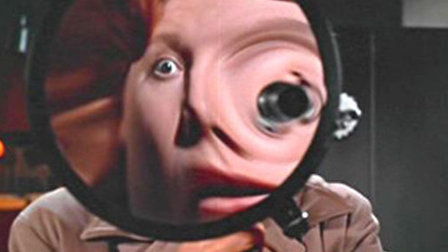
Carnivorous Couch 046 – Peeping Tom
